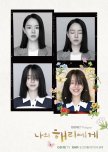This review may contain spoilers
This is not a love story.
Episode 1 starts with that ominous statement and it's true. If you watch this drama thinking that it's a love story, you're likely to be very disappointed. However, if you remove your love story glasses and replace them with "dissociation" glasses, this story is so rich and insightful. It's like a treasure trove.
While Eun Ho is the only one with the official diagnosis, the majority of characters in this story are actually displaying some kind of splintering. Eun Ho's splintering seems to come from a wound related specifically to isolation. Losing her parents at an early age and not trusting the grandmother who took her and her sister in seemed to plant early seeds of fear regarding a lack of social safety net. It's why she seriously overreacts to the possibility that Hye Ri will be isolated if she doesn't push herself to attend the school trip. She's transferring her own fear onto her younger sister instead of recognizing that her sister has a completely different threshold for social needs. The loss of her sister and grandmother is bad enough, but when the man she's imagined sharing her life with walks away without any warning, it's enough to push her into a crisis caused by the full realization of her worst fears. So she creates a second self, another character in the story of her life. By doing this she finds partial escape from the crushing burden she feels and simultaneously alleviates the guilt she carries in regards to the part she played in her sister's disappearance.
Kang Ju Yeon has completely dissociated into his second self when Hye Ri meets him. He has put to death all of his own plans and desires to step into the life he believes his brother would have lived. He's empty and miserable and angry because of it. His first few interactions with Hye Ri showcase glimpses of the resentment and anger just below the surface. But then she says something life changing. She's glad he's alive. And the part of him that he had buried with his brother begins to awaken. And he's lovely. The viewer can't help but want happiness for him. Kang Hoon does a fantastic job of conveying the appeal of the character he plays. For the first time since his brother's death, Ju Yeon allows his real self to want something and it's Hye Ri. Because she's the only thing he's allowed his true self to want, his desire for her is out of proportion to the time they've spent together or the relationship they've built. But she's his best proof that he's still alive. He's willing to leave his entire life for her, because he sees her as a gateway back into his true self.
Hyeon O is leading two completely separate lives. At work and in his past relationship with Eun Ho he's the golden boy, handsome, talented, on the rise. At home, he's a boy who was abandoned by his mother and raised by social outcasts and outlaws. The reason he can't marry Eun Ho is that he can't bear any crossover between his two worlds. If that happened, the people who admire him would know that deep down, he's really that abandoned, unloved little boy with a strange family that can't help him keep up the pretense he's created. He has deep, deep shame and it causes him to lash out cruelly when anyone gets too close to seeing that side of him, even blaming Eun Ho as the source of his embarrassment. Shame always points the finger outwards to distract from the inward wound. He also can't perceive Eun Ho's pain and splintering because of his own. His cruelty in the story is difficult to stomach, and it's understandable that viewers make a villain of him, however, all of his behavior makes sense (not to be read as is excusable) within the context of shame and dissociation.
Ji On may be the only whole character in the story and he serves as a kind of interpreter for Hyeon O, helping him to perceive and understand Eun Ho's behavior and motives.
Hye Yeon is also splintered, divorcing sex from genuine relationship on the one hand and pursuing a man who has no interest in her on the other. Je Yeon's statement that a person only has one heart is both a warning to her and to himself. He can't grow his brother's heart inside his chest to help him want the life his brother might have lived. He only has his own heart. She can't give away slivers of her heart to men who don't cherish them and retain wholeness at the same time.
All of this is set in an industry where people are expected to develop an on air persona separate from their own personality. Eun Ho's disgrace at work happens when her true reactions and personality bleed through into that on air persona. No one has an issue with her having multiple personalities. Her coworkers only cared that she kept the lines between them iron clad. Like Hyeon O. Jeon Jae Yong is another example of a strange kind of splintered personality, where he's a total goofball when he's not behind a camera, but a surprisingly capable anchor in front of it.
We still have two episodes to go, so we'll see how the writers wrap things up. Overall, this story has been fantastic, and the lighting, sound effects, music, and dreamy atmospheric tone all create a sense that the story itself is reflecting the characters urge to splinter in moments of pain and humiliation.
While Eun Ho is the only one with the official diagnosis, the majority of characters in this story are actually displaying some kind of splintering. Eun Ho's splintering seems to come from a wound related specifically to isolation. Losing her parents at an early age and not trusting the grandmother who took her and her sister in seemed to plant early seeds of fear regarding a lack of social safety net. It's why she seriously overreacts to the possibility that Hye Ri will be isolated if she doesn't push herself to attend the school trip. She's transferring her own fear onto her younger sister instead of recognizing that her sister has a completely different threshold for social needs. The loss of her sister and grandmother is bad enough, but when the man she's imagined sharing her life with walks away without any warning, it's enough to push her into a crisis caused by the full realization of her worst fears. So she creates a second self, another character in the story of her life. By doing this she finds partial escape from the crushing burden she feels and simultaneously alleviates the guilt she carries in regards to the part she played in her sister's disappearance.
Kang Ju Yeon has completely dissociated into his second self when Hye Ri meets him. He has put to death all of his own plans and desires to step into the life he believes his brother would have lived. He's empty and miserable and angry because of it. His first few interactions with Hye Ri showcase glimpses of the resentment and anger just below the surface. But then she says something life changing. She's glad he's alive. And the part of him that he had buried with his brother begins to awaken. And he's lovely. The viewer can't help but want happiness for him. Kang Hoon does a fantastic job of conveying the appeal of the character he plays. For the first time since his brother's death, Ju Yeon allows his real self to want something and it's Hye Ri. Because she's the only thing he's allowed his true self to want, his desire for her is out of proportion to the time they've spent together or the relationship they've built. But she's his best proof that he's still alive. He's willing to leave his entire life for her, because he sees her as a gateway back into his true self.
Hyeon O is leading two completely separate lives. At work and in his past relationship with Eun Ho he's the golden boy, handsome, talented, on the rise. At home, he's a boy who was abandoned by his mother and raised by social outcasts and outlaws. The reason he can't marry Eun Ho is that he can't bear any crossover between his two worlds. If that happened, the people who admire him would know that deep down, he's really that abandoned, unloved little boy with a strange family that can't help him keep up the pretense he's created. He has deep, deep shame and it causes him to lash out cruelly when anyone gets too close to seeing that side of him, even blaming Eun Ho as the source of his embarrassment. Shame always points the finger outwards to distract from the inward wound. He also can't perceive Eun Ho's pain and splintering because of his own. His cruelty in the story is difficult to stomach, and it's understandable that viewers make a villain of him, however, all of his behavior makes sense (not to be read as is excusable) within the context of shame and dissociation.
Ji On may be the only whole character in the story and he serves as a kind of interpreter for Hyeon O, helping him to perceive and understand Eun Ho's behavior and motives.
Hye Yeon is also splintered, divorcing sex from genuine relationship on the one hand and pursuing a man who has no interest in her on the other. Je Yeon's statement that a person only has one heart is both a warning to her and to himself. He can't grow his brother's heart inside his chest to help him want the life his brother might have lived. He only has his own heart. She can't give away slivers of her heart to men who don't cherish them and retain wholeness at the same time.
All of this is set in an industry where people are expected to develop an on air persona separate from their own personality. Eun Ho's disgrace at work happens when her true reactions and personality bleed through into that on air persona. No one has an issue with her having multiple personalities. Her coworkers only cared that she kept the lines between them iron clad. Like Hyeon O. Jeon Jae Yong is another example of a strange kind of splintered personality, where he's a total goofball when he's not behind a camera, but a surprisingly capable anchor in front of it.
We still have two episodes to go, so we'll see how the writers wrap things up. Overall, this story has been fantastic, and the lighting, sound effects, music, and dreamy atmospheric tone all create a sense that the story itself is reflecting the characters urge to splinter in moments of pain and humiliation.
Was this review helpful to you?





